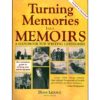As you prepare to write the memoir you have so long desired to have, you may be moved by memories or feelings that urge you to explore them and preserve them in writing. This is your impetus to launch your memoir project, but it is generally not enough to sustain your writing over the long haul without pre-writing.
As you put your memories down on paper, you find that your memory or feeling is vivid but it is not fleshed out with sufficient detail to sustain the reader’s interest nor to convey the essence of the memory or feeling.
Pre-writing to the rescue
The solution that will pull you out of this morass is likely to be pre-writing.
Pre-writing as the posts below explain is the process of gathering and ordering information before you begin to write.
No memoir should be written without some or even significant pre-writing. What you do before writing is important. Learn more about recalling information and organizing your writing in the posts below before you begin.
Think of writing a memoir as you would think of painting a room. A lot of the work when you paint is in the preparation: moving furniture out, washing the walls, taping the edges, stirring the paint (and buying the paint!). If you don’t do this preparation, painting will take hours longer in the end because you’re going to have to keep stopping to get stuff out of your way or to clean up mistakes.
Memoir pre-writing can play the same role of speeding up the process.
In conclusion
Remember: fail to plan; plan to fail. Do not omit to plan in the form of pre-writing.

Monday Focus: Pre-writing is more important than you think.
Pre-writing is the process of gathering and ordering information before you begin to write. Here’s where to start.

Should You Create an Outline or a Memory List for your Memoir?
DL: An outline or a Memory List? This is a perennial favorite with the search engines. I consider it to be a foundational post whose info can guide you to success. I hope you enjoy it.
A Memory List is far superior to an outline!
For some writers, there comes a moment in writing a memoir when the audacity of the undertaking hits them. Perhaps they think doorslammers like: “This can take forever.” “Writing a memoir will never pay for itself.” “I can’t afford to do this!” They reach for certainty. And that certainly if often a reversion to essay and report writing. They want an outline to assure the task gets done right. So, an outline or a Memory List?
The following is a comment to someone who asked in the Memoir Forum if she should create an outline and how to know when the page and chapters were the right length.
1. Do not write a memoir from an outline.
I do not write from an outline. Instead, I create a Memory List as outlined in Chapter 2 of Turning Memories Into Memoirs. The Memory List helps you to follow the promptings of the unconscious rather than the dictates of the conscious mind as happens with an outline. (An outline is great for an essay—”The Three Causes of the American Civil War”— but it is the death of an exploratory memoir.) So…
[Free Membership required to read more. See below. ]
We'd love to have you access this content. It's in our members-only area, but you're in luck: becoming a member is easy and it's free.
Already a Member?
Not a Member Yet?

Memoir Interviewing: how to prepare for one and carry it off!
Memoir interviewing is an integral piece of research. Although you may assume you can depend on your memory when you write your lifestories—memory isn’t always as reliable as you want it to be. Interviews with relevant family members and friends can supplement your memory and broaden the perspective of your memoir.
Below are some notes on how to prepare for the best memoir interviewing you’ll ever undertake!
1) Select whom you will be memoir interviewing.
If your time is limited, or your family is large and offers many choices, it will be all the more important to identify a manageable number of knowledgeable relatives and friends to interview.
[Free Membership required to read more. See below. ]
We'd love to have you access this content. It's in our members-only area, but you're in luck: becoming a member is easy and it's free.
Already a Member?
Not a Member Yet?

You Need Formal Research
Interviewing family members and friends is clearly a form of research, but interviews alone are usually not enough to give your stories the depth they require. For that, you need formal research.

Use This Instead of a Writing Prompt
A writing prompt in my estimation leads to nothing. I’m not a great fan of a writing prompt. Sure, they get you to writing something. And many people will insist writing something is better than writing nothing. Well, I’m not so sure of that.

5 Steps to Gathering Stories at Family Events
Gathering stories at family events—interviewing—is one of these basic steps you can master for writing your memoir. Following these basic steps, anyone can succeed at writing interesting and meaningful memoirs.
As a memoirist, you must always double-check the information you already have, and seek new material to flesh out your stories. Reunions, weddings, funerals, birthday and holiday celebrations rate well on both of these tasks: scattered relatives, each of whom has a piece of the family history to share, are in one place at one time. Gathering stories at family events is an opportunity not to be missed.
Gathering stories at family events
When it comes down to it, people love to tell their stories. The family historian’s job is to ask the right questions to get to the heart of the story. Here are five simple guidelines, extracted from both Turning Memories Into Memoirs and The Photo Scribe to facilitate gathering stories at family events. These suggestions will streamline the process for would-be lifewriters: [Free Membership required to read more. See below. ]
We'd love to have you access this content. It's in our members-only area, but you're in luck: becoming a member is easy and it's free.
Already a Member?
Not a Member Yet?

6 Easy Steps to Creating a Book of Memoirs
Creating a book of memoirs is possible
Celebrating and honoring your life by remembering and writing both big and small stories is very rewarding. It is a significant way to understand your life and to come to peace with it. Creating a book of memoirs will leave a legacy your family will treasure for generations–don’t you wish your grandparents had written their memoirs?
Follow these simple writing suggestions and you’ll find the task of preserving your stories is well underway.
1. First, make a Memory List
A Memory List a list of all your life’s important events and relationships. Your Memory List can have hundreds of items. When you sit down to write a story, you’ll have this list of topics handy. The Memory List helps you to focus on things that deserve the most attention. It also primes the pump of memory: the more you write, the more you’ll remember. Your list will grow as you write! At first, just jot things down. As the list gets longer, organize it chronologically. With your Memory List handy to write from, you will never again suffer from “writer’s block!” Creating a book of memoirs will be easier than before.
2. Start anywhere you feel like starting.
We'd love to have you access this content. It's in our members-only area, but you're in luck: becoming a member is easy and it's free.
Already a Member?
Not a Member Yet?

Three Tips for Effective Memoir Pre-Writing
Before you begin to write your memoir, there are a number of non-writing tasks which you must undertake—this phase of compiling your lifestory is called memoir pre-writing, and it is essential to writing better stories. People often think of pre-writing as a waste of time, but it is not. It will get your stories written more quickly and more interestingly. [Free Membership required to read more. See below. ]
We'd love to have you access this content. It's in our members-only area, but you're in luck: becoming a member is easy and it's free.
Already a Member?
Not a Member Yet?

(More) Better than Prompts: Five Tips to Help You “Jog Your Memory”
When starting on a memoir, it can be difficult to remember all the stories and memories you would like to include. You naturally want to jog your memory.
When you are intent on writing “from the inside out” as we at The Memoir Network hope you will, there are some useful techniques you can use—to add to compiling your Memory List and perhaps even to stimulate it.
[Free Membership required to read more. See below. ]
